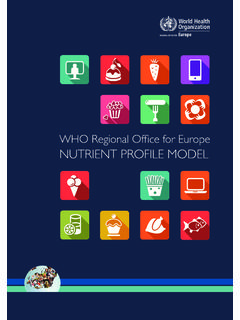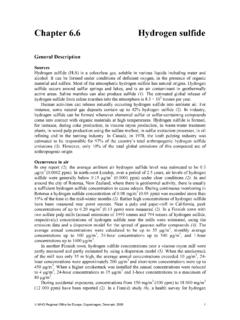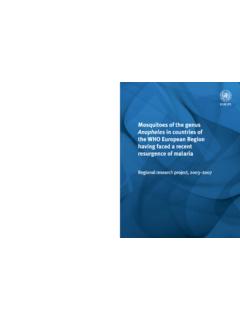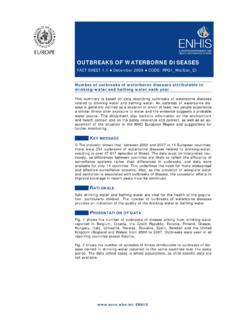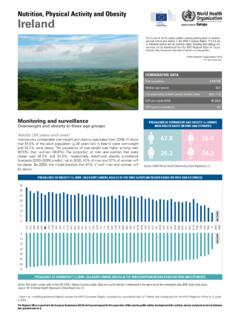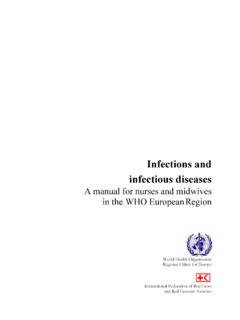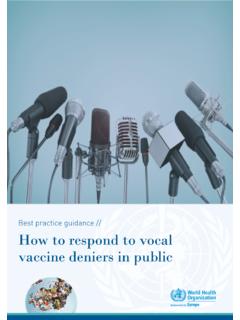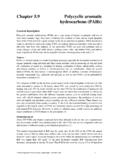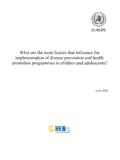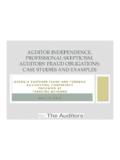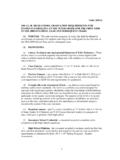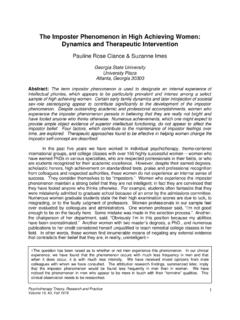Transcription of The WHO Regional SOCIAL DETERMINANTS OF …
1 Member StatesAlbaniaAndorraArmeniaAustriaAzerba ijanBelarusBelgiumBosnia and HerzegovinaBulgariaCroatiaCyprusCzech RepublicDenmarkEstoniaFinlandFranceGeorg iaGermanyGreeceHungaryIcelandIrelandIsra elItalyKazakhstanKyrgyzstanLatviaLithuan iaLuxembourgMaltaMonacoNetherlandsNorway PolandPortugalRepublic of MoldovaRomaniaRussian FederationSan MarinoSerbia and MontenegroSlovakiaSloveniaSpainSwedenSwi tzerlandTajikistanThe former Yugoslav Republic of MacedoniaTurkeyTurkmenistanUkraineUnited KingdomUzbekistanThe WHO Regional Offi ce for EuropeThe World health Organization (WHO) is a specialized agency of the United Nations created in 1948 with primary responsibility for international health matters and public health .
2 The WHO Regional Offi ce for Europe is one of six Regional offi ces throughout the world, each with its own programme geared to the particular health conditions of the countries it Centre forHealth and SocietySOCIALDETERMINANTS OF HEALTHP oorer people live shorter lives and are more often ill than the rich. This disparity has drawn attention to the remarkable sensitivity of health to the SOCIAL publication examines this SOCIAL gradient in health , and explains how psychological and SOCIAL infl uences affect physical health and longevity.
3 It then looks at what is known about the most important SOCIAL DETERMINANTS of health today, and the role that public policy can play in shaping a SOCIAL environment that is more conducive to better second edition relies on the most up-to-date sources in its selection and description of the main SOCIAL DETERMINANTS of health in our society today. Key research sources are given for each: stress, early life, SOCIAL exclusion, working conditions, unemployment, SOCIAL support, addiction, healthy food and transport and action for health need to address the SOCIAL DETERMINANTS of health , attacking the causes of ill health before they can lead to problems.
4 This is a challenging task for both decision-makers and public health actors and advocates. This publication provides the facts and the policy options that will enable them to 92 890 1371 0 World health OrganizationRegional Offi ce for EuropeScherfi gsvej 8 DK-2100 Copenhagen DenmarkTel.: +45 39 17 17 17 Fax: +45 39 17 18 18 E-mail: site: DE TER MI NANTS OF HEALTHE dited by Richard Wilkinson and Michael MarmotSECOND EDITIONTHETHESOLIDSOLIDFACTSFACTSWHO Library Cataloguing in Publication DataSocial DETERMINANTS of health : the solid facts.
5 2nd edition / edited by Richard Wilkinson and Michael factors environment support behavior status health promotion , Richard , 92 890 1371 0 (NLM Classification : WA 30)Address requests about publications of the WHO Regional Office to: by e-mail by post (for copies of publications) (for permission to reproduce them) (for permission to translate them)PublicationsWHO Regional Office for EuropeScherfigsvej 8DK-2100 Copenhagen , Denmark World health Organization 2003 All rights reserved.
6 The Regional Office for Europe of the World health Organiza-tion welcomes requests for permission to reproduce or translate its publications, in part or in full. The designations employed and the presentation of the material in this pub-lication do not imply the expression of any opinion whatsoever on the part of the World health Organization concerning the legal status of any country, territory, city or area or of its authorities, or concerning the delimitation of its frontiers or boundaries.
7 Where the designation country or area appears in the headings of tables, it covers countries, territories, cities, or areas. Dotted lines on maps represent approximate border lines for which there may not yet be full agreement. The mention of specific companies or of certain manufacturers products does not imply that they are endorsed or recommended by the World health Organi-zation in preference to others of a similar nature that are not mentioned. Errors and omissions excepted, the names of proprietary products are distinguished by initial capital letters.
8 The World health Organization does not warrant that the information contained in this publication is complete and correct and shall not be liable for any dam-ages incurred as a result of its use. The views expressed by authors or editors do not necessarily represent the decisions or the stated policy of the World health in DenmarkISBN 92 890 1371 0 Foreword 5 Contributors 6 Introduction 71.
9 The SOCIAL gradient 102. Stress 123. Early life 144. SOCIAL exclusion 165. Work 186. Unemployment 207. SOCIAL support 228. Addiction 249.
10 Food 2610. Transport 28 WHO and other important sources 30 CONTENTS4 The World health Organization was established in 1948 as a specialized agency of the United Nations serving as the directing and coordinating authority for international health matters and public health . One of WHO s constitutional functions is to provide objective and reliable information and advice in the field of human health , a responsibility that it fulfils in part through its publications programmes.

